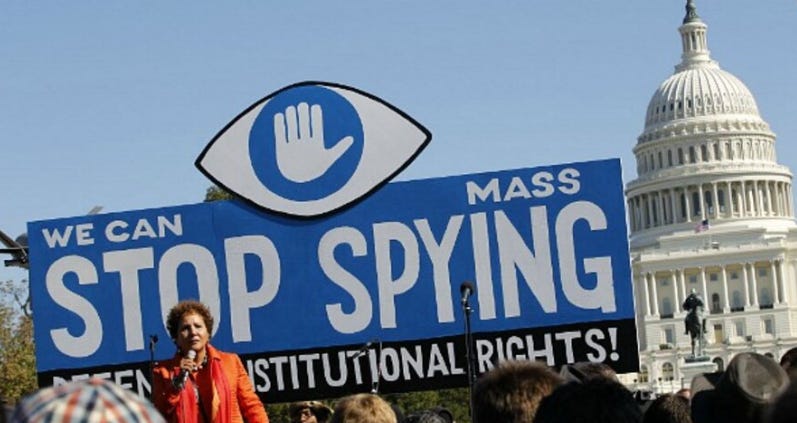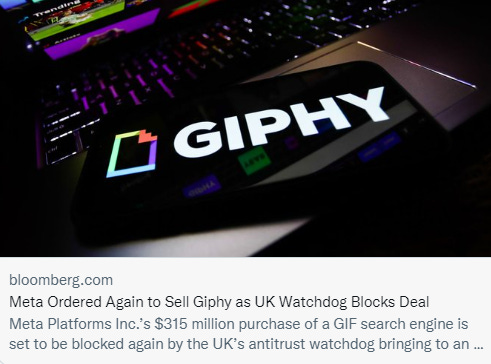The Apple’s iPhone is 14 years old, Twitter is 16, Meta’s Facebook is 18, and Amazon is 28. History has shown that the medium is the message and that cataclysmic changes in how we communicate bring dramatic shifts in our society. Now, a decade later, society has begun to ask, “how different is this moment in time from others?” Or how big actually “Big Tech?””
Europe’s network of data watchdogs has urged the European Commission to harmonize procedural rules across the EU to help unleash GDPR enforcement against the likes of Meta and Google. Companies like Google, Meta and Amazon have been deceiving lawmakers by lobbying through smaller front organizations, leading lawmakers claim. They are asking for the firms to be banned from engaging with EU institutions. Modernization of EU antitrust laws muddied the water with situations in which promotion of public policies would benefit from corporate collusion.
Google moved the role of (ex-staff) Ariel Koren overseas immediately after Ariel opposed its $1B AI/surveillance contracts with Israel. Attorney General of Washington, Bob Ferguson, filed a motion seeking the maximum penalty for Facebook’s 822 intentional campaign finance violations —$24.6 million, because Facebook repeatedly violated a law. One of the sophisticated-but-scary Meta: Meta is trying to figure out how to read your mind, the Quest Pro isn’t just going to inform Meta about what you say you’re interested in, tracking your eyes and face will give the company unprecedented insight about your emotions.
7 Days ago (October 10th), European privacy regulators ruled that American services, including Google Analytics and MailChimp, could violate Europeans’ privacy rights because they moved data through the United States. How big is “Big Tech?” Meta bet $70 billion on the Metaverse and the big innovation they're bragging about is virtual legs (in Meta Horizon platform). This $70 billion could fix the massive issues with election disinfo & interference or the design features that make young people mentally ill. But no. Virtual legs are Meta priority. The U.S. Department of Justice asked a federal court for a two-week pause of Booz Allen Hamilton’s $440 million acquisition of defense firm EverWatch, hoping to buy more time to appeal an earlier ruling that allowed the deal to proceed. Last time Booz Allen Hamilton was very stunning in the headline of every newspaper in the world, because, ex-staff, Edward Joseph Snowden, is now in exile in Russia since May 2013, after whistleblowing of sophisticated surveillance by the U.S. Government across the world. Snowden was ultra-patriotic, enlisted in the U.S. Army on May 7th, 2004, and became a Special Forces candidate through it’s 18X enlistment option. Last month, after 9 years, Snowden was granted Russian citizenship by Russia Government.
Another troubling aspect about Big Tech monopolies isn't just how they preference themselves against competitors, but also how they'll collaborate to protect each other. In this case Google listed Amazon as a legitimate news source for stories about Amazon. While Amazon threatens its workers with disabilities, the news says it's fighting for the disabled. Google News continues to allow Amazon to list itself as a newspaper, peppering its news feed with its own press releases as news.
Truth Social’s content moderation, a social media which is used (100%) by Trump supporters, is so bad, Google is refusing to be associated with them and will not approve the app for the play store. The FBI attacker was a prolific Truth Social user who was likely exposed to Former President Trump's posts inciting violence against law enforcement after the Mar-a-Lago search. Is it more dangerous to allow Trump to radicalize and enrage his base within their own echo chamber on Truth Social instead of allowing him to do it in something closer to a diverse public forum where his associates are accountable? When QAnon supporters thought they had Trump's indirect support, they staged a full-fledged assault on the U.S. Capitol. Truth Social might seem like a joke but something dangerous is happening. General Hayden, former Director CIA, in September said the Trump supporter is “the most dangerous ever he was watching”, even more dangerous than Russia. Parler, like Truth Social, nearly 100% users of Parler is Trumps fans, already acquired by Kanye West.
Meta’s Facebook and other tech giants have been under growing pressure to crack down on the spread of mis- and disinformation across their platforms. Alongside taking away ad revenue from local news and the selling of consumer data, one of the biggest dilemmas for these platforms has been hate speech. When Facebook and others removed Alex Jones, a ultrahardliner Trump (Jones get fine US$ 965 millions, must pay to Sandy Hook’s victim) and Infowars from their platforms, users could pretty much say anything they wanted online without consequence as long as they were not directly threatening individuals or groups based on certain protected identities such as race, ethnicity, national origin, religious affiliation, sexual orientation, and gender.
These relatively loose policies have enabled a surge in controversial speech and incited deep debate over the arbiters of truth, the bounds of free speech, and how online communities could, or should, support productive civil discourse. Twitter, Facebook, and Google take more steps than ever before to show their good faith in tackling this problem from bot removals to the scourging of false accounts and hate accounts. Almost every day, changes on these platforms make front page news.
1 Month ago (September 13th), During hearing with Twitter Whistleblower Peiter “Mudge” Zatko, Senator Richard Blumenthal (Connecticut) suggests a new government agency dedicated to enforcement of privacy and security standards as Mudge alleges that the FTC has allowed Twitter to "grade their own homework" on their privacy consent decree. Experts agree that claims of conservative censorship are disinformation. Mudge uncovered real threats to democracy & republicans are too busy playing the victim to pay attention. Mudge revealed that Twitter had no logging system to track user data or internal systems by nefarious actors, including foreign agents. Mudge also reveals that the FTC allowed Twitter to “grade their own homework” with regard to a 2011 data privacy consent decree. He alleged the agency was in over its head and missed rampant violations at the company.
Despite the DC order “Blueprint for new EU - US transfer data” this month, there are still fundamental differences in the level of privacy and data protection in the US and the EU which remain too large to make up for. For some cases, perhaps you agree to cookies because you are afraid that the website you visit will not work without it "dark patterns", can also include demands to create unnecessary accounts, or the practice of tricking people into giving up more personal information than necessary. This is a tricky definition and still “grey area” between the new Blueprint EU - US.
The conceit that we are expected to manage individual cookie preferences on a site-by-site basis is ridiculous to start. But a recent investigation shows that rejecting cookies doesn't even work much of the time. Policymakers have left us each to manage our own privacy, still giving out advice (including guidance on how to block tracking). But in general, both the U.S and EU citizens must urge legislators to prohibit invasive practices instead of mandating clunky opt-ins and opt-outs.
One of the reasons super apps are a delusion is that your app has to become a platform and Apple explicitly disallows that. Not in the EU, not in U.S., but in China. China has redefined the perception of privacy to position the state and citizens on the same side of the battle against private companies.
Apple deliberately turns a blind eye to China's do-everything app WeChat miniprograms is conveniently forgotten whenever WeChat envy comes up. Disinformation is saturating the widely used social media platform WeChat and poses a growing threat to Chinese American voters in the November U.S. midterm elections. In mainland China, WeChat users have had their accounts blocked as part of a campaign to kill discussion of a rare protest in Beijing, part of the Communist Party's efforts to cleanse China's internet of even the whiff of dissent. A large number of users reported losing access to WeChat, a super app that has become virtually indispensable for daily life in China.
Hundreds posted in WeChat's customer-service forum indicating they were suspended after reposting images of the protest. Some users offered desperate, if somewhat circumspect, apologies. One user referred to “an incident this afternoon” and apologized. WeChat platforms return blank pages in searches for the seven men on the Communist Party's Politburo Standing Committee, including Xi Jinping and Li Keqiang. Others provide links to state-media reports touting the men's virtues. The head of the U.K. electronic intelligence agency called China “the national security issue that will define our future,” saying it has "deliberately and patiently set out to gain strategic advantage by shaping the world’s technology ecosystems.” It shows how advanced Tencent's (WeChat's parent) A.I. censorship is compared to other social media platforms.
The awkward, scary takeaway: not just China, any country can fall for surveillance tech, and we need early regulation to prevent that. Like in India, Modi’s government target journalists, public intellectuals, or human rights activists on the ground raising issues of civil importance, then book them on a case and send in the agencies, who are being weaponized against anyone who is working critically.
Nearly one in four top FTC officials owned or traded individual stocks of tech companies such as Amazon Inc., Meta Platforms Inc. 's Facebook, Alphabet Inc.’s Google, Microsoft Corp. and Oracle Corp. More complicated, Lina Khan, Chief of FTC itself, saying that in the FTC lawsuit against Facebook, Facebook has ten lawyers for every one FTC lawyer on the case. 16 Democrats sided with Big Tech and voted against the Merger Filing Fee Modernization Act that passed the House 2 weeks ago. Researcher Kimi Kaiser found how much they got from Amazon, Google, Meta, and Microsoft this cycle through the August monthly filings.
Pete Aguilar (Vice Chair of House Democrat; California) received $37,500 from Big Tech. He sided with Big Tech and voted against the Merger Filing Fee Modernization Act. Nanette D. Barragan (California) received $5,500 from Big Tech. Like Pete, she sided with Big Tech and voted against the Merger Filing Fee Modernization Act. Eric Swalwell, full stop anti-gun lawmaker and House Intelligence Committee (California), received $19,000 from Big Tech. He sided with Big Tech and voted against the Merger Filing Fee Modernization Act. Other 13 Democrats received $2,000 - $22,000 for the same issues by Big Tech. House Democrats who voted against the package of new antitrust law were not among those in the top 20% most competitive districts in the country, based on data from the Cook Political Report. That runs counter to speculation that congressional leaders may be hesitant to schedule a vote on AICO and OAMA to spare Democrats in competitive races from having to vote on an issue that could be used against them.
Policy advocates who have been pushing for new legislation reining in Big Tech’s power have seen their hopes lifted and shattered several times throughout the past few months.
Last week marked one of the brighter notes for those supporting the push for new antitrust laws, when the House passed a package of bills giving enforcers more resources to go after anti-competitive mergers and giving state attorneys general more power over in which courts they can bring antitrust lawsuits. While the legislation that passed 242-184 is less ambitious in scope than some of the more sweeping proposals making their way through both chambers of Congress, it is cause for hope, according to a new memo from the Tech Oversight Project, a nonprofit that advocates for antitrust reform.
Sacha Haworth, Executive Director of Tech Oversight Project, makes the case that the decisive passage of the legislation last week shows there is still a chance for two other key bills to pass in the lame-duck session later this year. Those bills are the American Innovation and Choice Online Act (AICO) and the Open App Markets Act (OAMA), which would essentially bar large platforms like Amazon, Meta, Apple, and Google from favoring their own products over rivals that rely on their marketplaces (the latter bill is focused squarely on mobile app stores). Haworth goes as far as to say, “if this voting pattern holds, AICO and OAMA will breeze past both chambers with ease.”
She contends Rep. Ken Buck, R-Colo., the key Republican champion of tech antitrust reform in the House, delivered on his promise of “a tidal wave of Republican votes,” despite opposition from other prominent party members like House Minority Leader Kevin McCarthy, R-Calif., and Judiciary Committee Ranking Member Jim Jordan, R-Ohio. Without Big Tech’s Section 230 liability protections, U.S. tech companies either have to aggressively over censor or take a hands off approach, with one extreme destroying freedom of information or the other making platforms even more dangerous and filled with hate. We all have an interest in an internet with general freedom of expression and content moderation rules that keep us safe.












You pretty much covered everything. I would like to add that the FBI interfered in the 2020 Presidential election by manipulating the social media companies into calling the Hunter Biden laptop "Russian Disinformation" and censoring anyone who said otherwise. The FBI conducted as many as 3.4 million searches of data in the U.S. without a warrant over the year 2021, according to a new government report.
https://news.yahoo.com/fbi-conducted-3-4-million-192219135.html
The FBI also illegally surveiled over 278000 Americans in 2022.
https://www.reuters.com/world/us/fbi-misused-intelligence-database-278000-searches-court-says-2023-05-19/